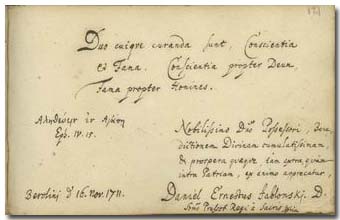
Duo cuique curanda sunt, Conscientia et Fama. Conscientia propter
Deum, Fama propter Homines.

Eph. IV. 15.
Nobilissimo D[omi]no Possessori, Benedictionem Divinam
cumulatissimam, & prospera quaeque, tam extra, quam intra Patriam,
ex animo apprecatur,
Daniel Ernestus Jablonski D.
S[e]r[enissi]mo. Prussorum Regi à Sacris Min[ister]
Berolini d. 16. nov. 1711.
|
* The quotation from St. Paul (Eph 4:15)
is originally:
alêtheuontes en agapê. It is also quoted by Fabricius on
p. 253.
|
|
|
Take care of these two things: your conscience and your
reputation; your conscience in front of God, and your reputation
in front of men.
“Speaking the truth, in love.” Eph 4,15.
*
I wish all the divine blessings and fortune
from my heart to the noble possessor [of this book], both outside
of his fatherland and at home.
Daniel Ernst Jablonski
court pastor of His Majesty the King of Prussia
In Berlin, on November 16, 1711.
|
p.
121. Berlin, November 16, 1711
Jablonski, Daniel Ernst
(1660-1741), German Reformed
theologian and Hebraist
Daniel Ernst Jablonski was born on November 26, 1660
in the village of Hochzeit near to Danzig, a son of Peter Figulus (1617-1670),
and grandson of Jan Amos Komenský (Comenius). His elder brother was
the historian Johann Theodor Jablonski (1654-1731). His father was
yet a child when in 1629 the “Edictum restitutionis” of Emperor
Ferdinand II. made the community of Czech Brethren, including his
family, flee from Bohemia. The young Peter Figulus followed
Comenius, and became his student in the high school of Lissa
(Leszno, Poland). In 1649 he married the daughter of his
professor, Elisabeth, and in 1650 he accompanied his father-in-law
to Hungary. From 1654 he was a court preacher in Danzig. His son
Daniel Ernst, who changed the name of his father for the old name
of the family, first learned in Lissa like his father, between
1677 and 1680 he attended theology, philosophy and Oriental
languages in Frankfurt an der Oder, and later he visited the
universities of the Netherlands and Britain together with his
brother. After his return to Germany he became pastor of the
recently established Reformed community in Magdeburg. From 1686 he
was pastor of Lissa and rector of the local school. In 1691 he was
appointed court preacher in Königsberg, and two years later in
Berlin. Thanks to his Prussian relations he managed to seize some
help for Lissa in the Northern war, and its inhabitants found
refuge in Prussia after the devastation of the town in 1707.
Jablonski also organised a fundraising for the rebuilding of the
school and the church. He also took part in the direction of his
Church. From 1718 he was a member of the German Reformed church
council, and from 1729 of the directory of the church. He made
efforts for the union of the Reformed and Lutheran churches; on
the relative conferences he also represented the united Czech
Brethren, who had elected him their bishop in 1699. At that time
he and Leibniz cherished such plans of union that would have also
included Catholics. He greeted the formation of the community of
the Brethren of Herrnhut, and he managed to assign the right of
the consecration of their bishops from 1737 to Count Zinzendorf.
He was in close relation to Leibniz. They composed together the
charter of the Scholarly Society of Berlin and its deed of
foundation signed by Prince-Elector Frederick III (later Frederick
I King of Prussia). At the foundation in 1700 Leibniz became
the president of the Society, while Jablonski the president of the
department of Oriental languages. In 1733 he became the third
president of the Society. He was in correspondence with several
outstanding scholars of the age, including the elder Ferenc Pápai
Páriz, with whom he conferred about the composition of a work of
church history. He won several stipends for Hungarian students in
Frankfurt an der Oder. In 1706 he was granted the degree of
doctorate of divinity by the University of Oxford. He published
the Hebrew Tanach, the Talmud of Babilon, and Hebrew prayer books.
He run a Hebrew print for a long time, albeit at the end with
remarkable deficit. He died in Berlin on May 25, 1741. His son
Paul Ernst Jablonski (1693-1757) also followed his orientalist
career. Some of his important works:
Stultitia et irrationabilitas atheismi … a Richardo Bentley
… in latinum vertit Daniel Ernestus Jablonski. Berlin, 1696. (The
folly and unreasonableness of atheism). – Biblia Hebraica
cum notis Hebraicis et lemmatibus Latinis. Berlin, 1699. –
Jura et libertates dissidentium in religione Christiana in regno
Poloniae et in M. D. Lithuaniae … Berlin, 1708. –
Sammlung einiger vertrauten Briefe … zwischen … Leibnitz und
… Jablonski, auch andern Gelehrten … Hrsg. Johann Erhard
Kapp. Leipzig, 1745. – Das Babilonische Talmud. 1715-21. 12
Bde.
Paul Ernst Jablonski, the son of Daniel Ernst made
his note in the Album in July of 1713 (p. 361).
• ADB •
Jöcher • Krollmann 294 • Michaud • NDB • PSB X 253 |

